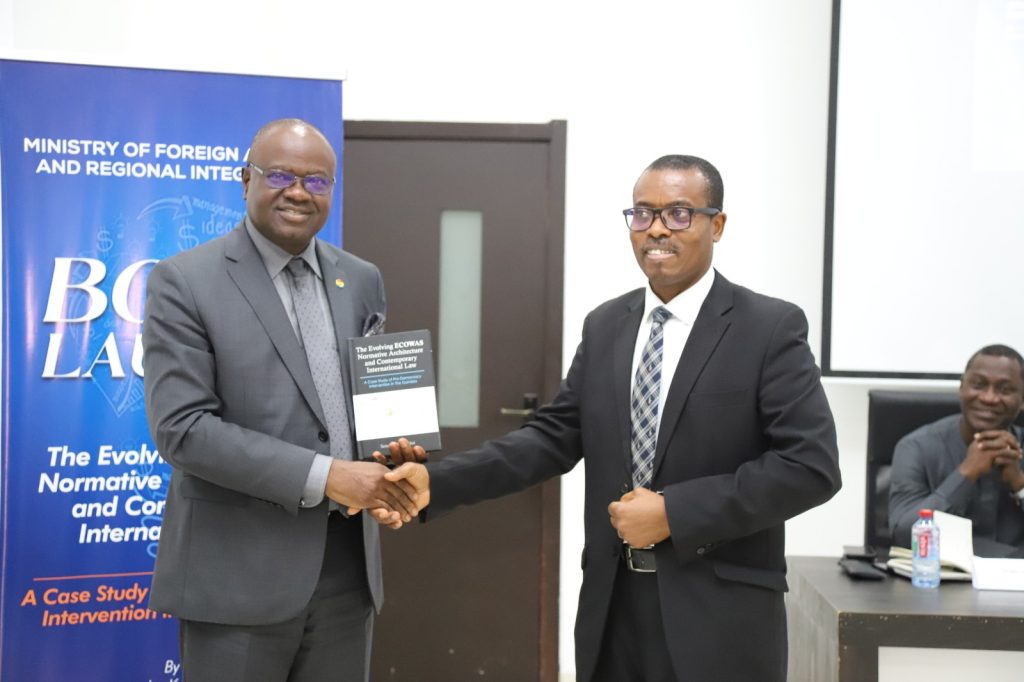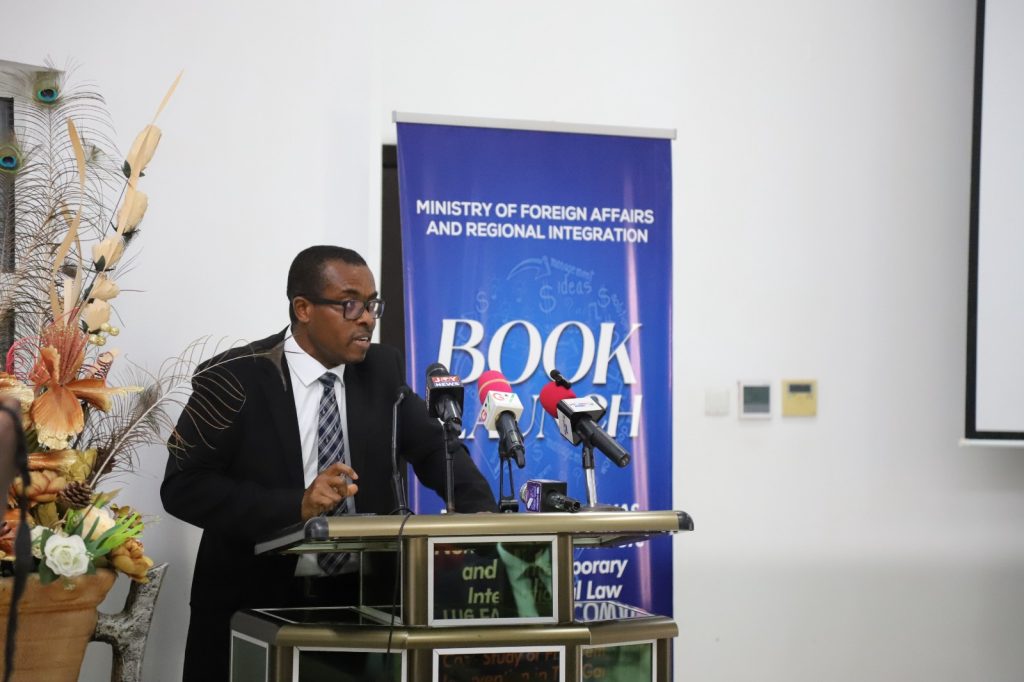By Iddi Yire
Accra, April 18, GNA – Mr Kwaku Ampratum-Sarpong, a Deputy Minister of Foreign Affairs and Regional Integration in-charge of Political and Economic matters, has launched a book titled “The Evolving ECOWAS Normative Architecture and Contemporary International Law: A Case Study of Pro-democracy Intervention in The Gambia” in Accra.
The 459-paged Book written by Dr Senalor K. Yawlui, a Ghanaian Diplomat and an Academician, begins with a background to conflict situations and political instability on the African continent and measures adopted by African governments and sub-Regional Economic Communities such as the Economic Community for West African States (ECOWAS) to address the unfortunate trend, which appears to hinder the development of the continent.
A brief theoretical framework follows this background and discussions on State Sovereignty and Humanitarian Intervention in Contemporary Law in the context of the primacy of the protection of human rights, ECOWAS Peace, and Security Architecture, as well as a general overview of ECOWAS’ interventions.

The discussions later dealt with ECOWAS’ intervention in The Gambia and an assessment of ECOWAS’ Governance Agenda, winding up with concluding remarks and recommendations.
Touching on Background to Conflict Prevention and Management in Africa, the book indicated that in the past three decades, there had been civil unrest an incident of catastrophic violent conflicts and human suffering in Africa on a scale unparalleled in human history.
It said several millions of Africans, notably women and children, had been killed in deadly conflicts on the continent.
The book revealed that the death toll of such devastating conflicts includes but is not limited to those of Angola (nearly 650,000), the Democratic Republic of Congo (more than 3 million), Sudan (more than 2.5 million), Rwanda (nearly one million), Burundi (more than 300,000), Liberia (250,000), Sierra Leone (about 75,000), and Uganda (40,000).
Mr Ampratum-Sarpong in his address at the book launch lauded the author for coming out with the publication and that it offers a first attempt at establishing a vital linkage and that in doing so the manuscript firstly highlights the legal response if ECOWAS and the African Union (AU) to conflict situations on the African continent, which appears to be hindering the Continent’s development.
It provides an overview of the institutional transformation of ECOWAS as an economic organization into one for the promotion of a rule based system anchored on the entrenchment of democratic norms and rules of law towards regional stability for effective regional integration for the benefits of the community citizens.
He said the book also offers synopsis of the general intervention and institutional development of ECOWAS, seen as one of the most dynamic regional and economic communities in Africa and an effective component of the African Peace and Security Architecture linking all regional economic communities of the continent.

He said, with the comprehensive review, he recommends the book to policy makers, academia, the diplomatic community, staff of the Foreign Ministry, students engaged in contemporary issues and in public law.
Professor Kwadwo Appiagyei-Atua, Senior Lecturer, Faculty of Law, University of Ghana, who did a virtual review of the book said the book was a well researched and well written one and he strongly recommended it to policy makers, MPs, diplomats, staff of ECOWAS and other international organizations, academia, as well as students.
Dr Senalor K. Yawlui, the author of the book said one of the critical reasons why he embarked on the book write-up, which was obviously an upgraded version of his doctoral thesis was to make a contribution to tell the African story from an African perspective; saying, “so that, we don’t shift that space to the outside world to be shaping the narratives of our continent.”
He reiterated that ECOWAS had done tremendously well, beginning with the Treaty of 1975 for the establishment of an economic integration that the subregion recognized earlier in the day that there could not be integration or prosperity without peace and security, which obviously was the foundation for any meaningful economic integration.
He said following the experience of the devastating Liberian and the Sierra Leonean wars, there was a revised Treaty of ECOWAS in 1993, which set the ball rolling for further processes of regional integration, which obviously provided a framework – The Peace and Security Architecture of ECOWAS and subsequent protocols and promotion of democracy and good governance.
He said among the regional economic communities the ECOWAS was by far the most robust regional economic community on the African continent; declaring that “and that story needed to be told and that is part of the focus of my study”.
Dr Kwaku Agyeman-Budu, Dean Ghana Institute of Management and Public Administration (GIMPA) Faculty of Law, who chaired the book launch, said the book delved deeply into the post-electoral dispute in The Gambia in 2016 and its effects on human rights; as well as the ECOWAS Peace and Security Architecture and how it worked hand-in-hand with the African Union (AU) Peace and Security Architecture as well.
The event was attended by Ministers of State such as Madam Mavis Nkansah Boadu, a Deputy Minister of Foreign Affairs and Regional Integration in-charge of Finance and Administration; representatives of the diplomatic community in Ghana, Members of Parliament (MPs), staff of the Ministry of Foreign Affairs and Regional Integration, academia, civil society organisations and the public.
GNA